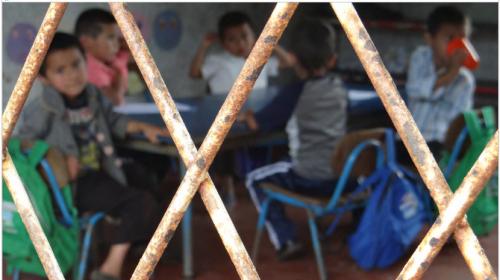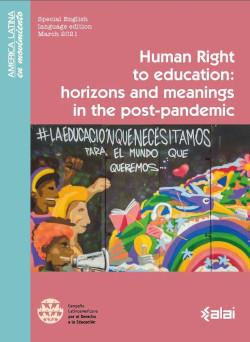The right to education from the start
it is necessary to rethink education from the initial level, recognizing it as the only and essential tool to advance towards the development of a more egalitarian and equitable society, within diversity.
- Análisis

| Article published in ALAI’s magazine No. 551: Human Right to education: horizons and meanings in the post-pandemic 05/03/2021 |
“A crisis becomes a disaster only when we respond to it with preformed judgments, that is, with prejudices”
Such an attitude exacerbates the crisis and also prevents us from experiencing reality and deprives us of the opportunity to reflect on what that reality has to offer.
Hannah Arendt
The ideas expressed in this document are inevitably affected by the pandemic situation generated by COVID-19, which has highlighted the weak social, economic, democratic and ethical scaffolding in which we are living, built and perfected since the beginning of the last century with the introduction and continuous strengthening of the economic philosophy of neoliberalism (Foucault, 2001). The enormous inequalities and social precariousness, as well as the inefficiency of public policies in health, education, housing and labor, have once again put the spotlight on our Latin America as the most unequal region on the planet.
According to the UNDP report (2019), the richest 10% concentrates 37% of income and the poorest 40% receives 13%. This is exacerbated by the strengthening of a very present Eurocentric system that systematically colonizes us, oppresses our analytical and reflective capacity and makes everyday and ancestral knowhow invisible, as an original and inspiring source for knowledge generation. Education has been taken as the main instrument of adaptation and techno-disciplinary fragmentation, to consolidate capitalism as a mode of production with the consequent status quo of inequality.
Thus, the consequences of the health crisis and the different social manifestations that have been felt in different countries of the region cannot go unnoticed, given the ethical and political imperative to recognize and evidence these demands in order to give them the relevance they require and claim. Therefore, the pedagogical hope (Freire, 1993) whose basis is the conception of the world from the decolonial and transformative educational practice, becomes an impossible mission in a framework preconceived for training. Citizens today are questioning themselves, recognizing their own awakening from a submissive lethargy, but also questioning the set of educational and social organizations, so that we reflect critically, assuming a more active role of political advocacy. People have lost their fear and, little by little, a civil society with conviction and the will to transform history has been growing stronger.
Now more than ever, it is necessary to rethink education from the initial level, recognizing it as the only and essential tool to advance towards the development of a more egalitarian and equitable society, within diversity, which embraces the major goals set forth at the planetary level for Sustainable Development, in the 2030 Agenda (UN 2015). The 17 Goals that make up this agenda constitute a commitment and a great challenge to complete what has already begun with the Millennium Development Goals (2000-2015 agenda). Addressing the most urgent problems facing the world today and responding to the threat of climate change are tasks that commit us and invite us all to create a genuinely livable world.
Goal 4, quality education, states that it is precisely this process that is the basis for improving people's quality of life. Access to inclusive and equitable education contributes to providing the local population with the necessary tools to develop innovative solutions to problems.
Undoubtedly, these agreements involve us as an organization to promote actions that favor the full development of people, particularly children, through respect for their political, social, economic and cultural rights, as expressed in the Convention on the Rights of the Child (CRC). Since its creation in 1948, the World Organization for Early Childhood Education (OMEP) has had this purpose that gives meaning to its existence. Thus, in the framework of the Declaration of Panama (2019), 30 years after the Convention, it renews its commitment to prioritize the best interests of the child, considering the four guiding principles that this Treaty establishes: the right to non-discrimination, to life, to survival and development, to freedom of expression and to be heard. However, the Declaration also notes that too many children in the world are living in conditions that deserve immediate action, such as famine, armed conflict and its physical, mental and emotional consequences; migration and displacement that has left children living in camps, separated from their parents or in prison; climate change, pollution, environmental degradation and increasing natural disasters, racism, xenophobia, gender discrimination and sexual and labor exploitation.
Lines of action
The task is enormous and complex, and requires joining forces and the necessary synergy to meet these demands. OMEP, assuming the commitment to make an effective contribution in this sense, has proposed 4 broad lines of action that allow for interaction with other organizations and institutions and the recognition of its own actions. Thus, even within this complex and systemic reality, these actions can find their strategic place, concentrate individual efforts and contribute effectively to the common purpose of breaking with the social and economic structural determinism, which has strongly affected children, women, the elderly and the indigenous population, in a much more unfavorable scenario as a consequence of the pandemic.
Among the proposed lines, we can mention political advocacy, which aims to amplify the voices of children and promote the respect and fulfillment of their rights in the construction of public policies and in social and citizen mobilization, in order to generate intersectoral actions that tend towards the transformation of reality in pursuit of the integral wellbeing of children and their families.
Make visible and raising awareness of the importance of early education and positive parenting, means defending the citizen's right to participate from the start of life. Another line is the construction of scientific, pedagogical and political reference, which aims to generate knowledge that gives a genuine basis to their struggles and actions, whose guiding principle is the ecoprotection of children and their relationship with the environment, human caring, and immunization against those elements that interfere and harm them in their development and hinder their self-building as full human beings, able to design their own life project, to expand their possibilities, their field of action, and to strengthen their sense of freedom.
(Translation ALAI)
- Desirée López de Maturana Luna is an academic at the University of La Serena, Chile. Vice-president of OMEP - Latin America.
Bibliography
- Arendt, Hannah (1993). La condición humana. Barcelona: Paidós
- División Jurídica de la Comisión Nacional del Medio Ambiente (2007). LEY 19.300 Sobre Bases Generales Del Medio Ambiente Modificada por la ley 20.173
- Foucault, Michel (2001). La ética del autocuidado como práctica de la libertad. París: Gallimard.
- Freire, Paulo (1993). Pedagogía de la esperanza. Mexico: Siglo XXI
- PNUD (2017). ¿Cómo avanzan Chile y el mundo hacia los Objetivos de Desarrollo Sostenible? Gobierno de Chile
- PNUD. https://www.undp.org/content/undp/es/home/sdgoverview/mdg_goals.html
- OMEP (2019). Declaración de la asamblea Mundial. Panamá
- OMEP (2017). Organización mundial para la educación preescolar – OMEP. Revista Latinoamericana de ciencias sociales, niñez y juventud. Centro de estudios avanzados en niñez y juventud. Colombia, Manizales
Del mismo autor
- The right to education from the start 15/03/2021
- El derecho a la educación desde el principio 03/02/2021
Pandemia
- Gabriela Ramírez Mendoza 07/02/2022
- Jyotsna Singh 06/02/2022
- Gabriela Ramírez Mendoza 06/02/2022
- Richa Chintan 10/01/2022
- Isaac Enríquez Pérez 03/01/2022

